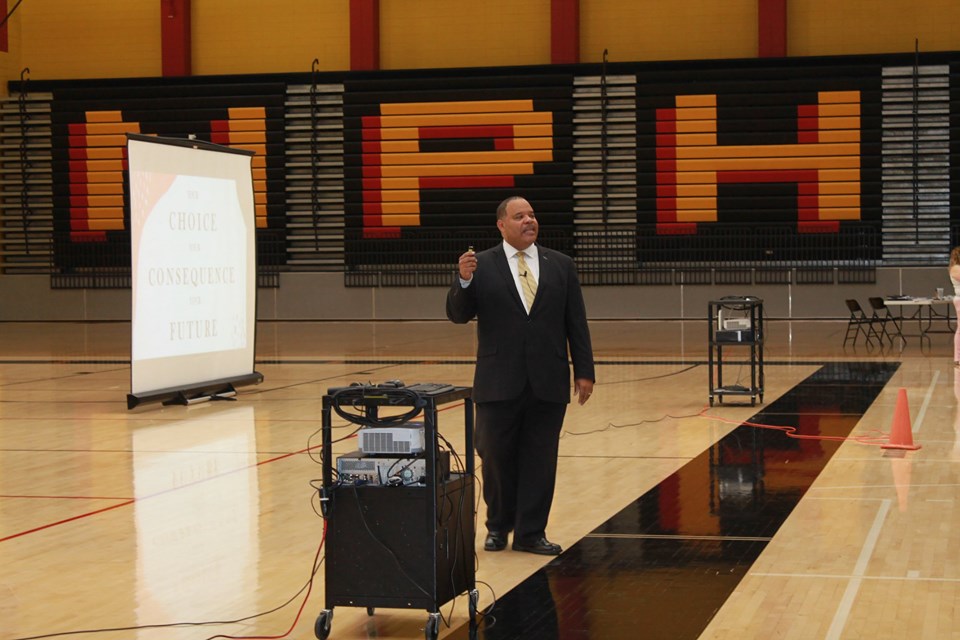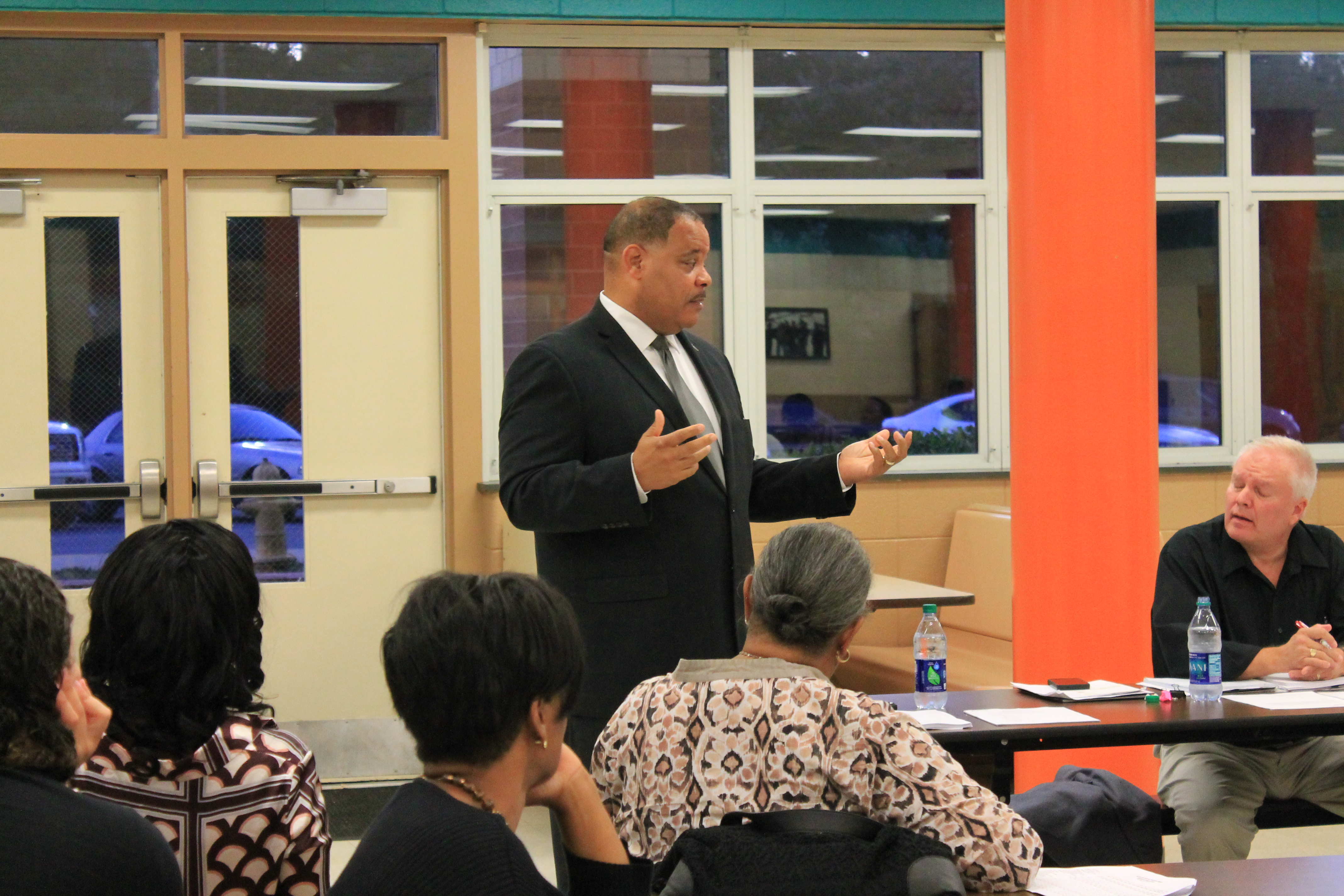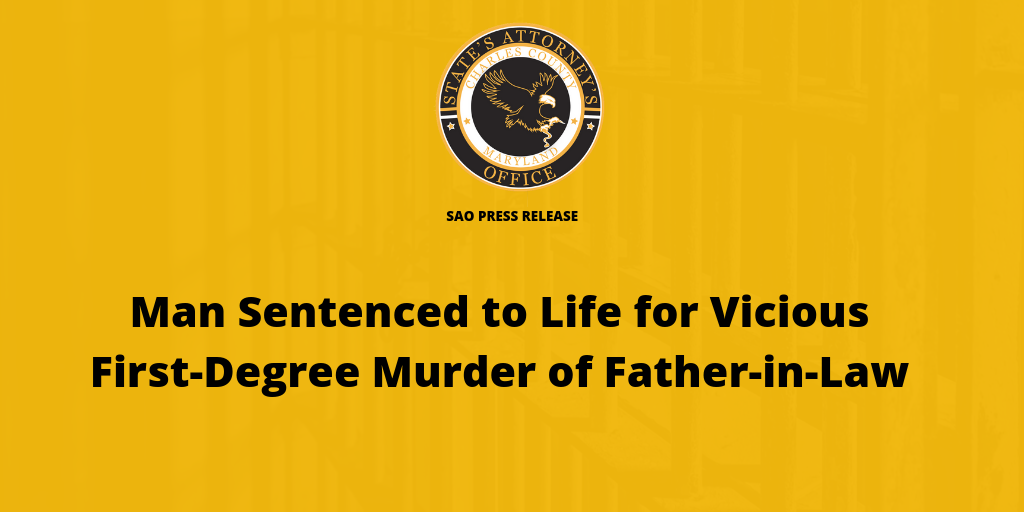On Wednesday, September 11, 2019, State’s Attorney Tony Covington visited North Point High School to present “Think About It” to the freshman class.
Middletown HOA Meeting
On Thursday, September 19, 2019, State’s Attorney Tony Covington had the pleasure of speaking to residents of the Middletown Woods community regarding the work of the SAO.
Last Co-Defendant Pretending to be U.S. Marshal in Home Invasion Sentenced to 25 Years in Prison
State v. Bernard Green, C-08-CR-18-000388
LA PLATA, MD—Tony Covington, State’s Attorney for Charles County, announced that on Thursday, September 12, 2019, Charles County Circuit Court Judge Amy J. Bragunier sentenced Bernard Green to 25 years in prison for Home Invasion and Use of a Firearm in the Commission of a Crime of Violence.
On June 27, 2019, Green entered a guilty plea to the above-mentioned charges in Charles County Circuit Court.
On September 3, 2017, officers responded to the 3500 block of Elsa Avenue in Waldorf for the report of a home invasion. Upon entrance to the residence, officers discovered two adult victims, one male and one female, confined in separate areas in the basement level of the home. The female victim’s hands and feet were bound with duct tape and plastic zip ties, while the male victim’s hands were handcuffed behind his back and feet were bound together with flex cuffs.
An investigation into the home invasion revealed that during the evening hours of September 3, 2017, three suspects knocked on the door of the victims’ residence. Each of the suspects wore jackets that read “US Marshals” and relayed that they were there for official business. Soon after the victims answered the door, the suspects forced the victims into the basement area of the residence, assaulting them both and bounding them. Young children were also present at the residence during the incident, but they were unharmed. Before fleeing the scene, the suspects stole marijuana, money, two handguns, and the male victim’s vehicle.
During the course of the investigation, Green, as well as co-defendants Dakevis Larry Maryland and Danzie Lee Barron were identified as the suspects who entered the home. Co-defendant Michael Damion Coffer was discovered to be a part of the home invasion by providing the victims as a target to Green; although, he was not present on the night in question and never entered the residence. A last suspect, co-defendant Jermel Andrico D’Aubrey Thomas was identified to have a limited role as a look out during the home invasion but abandoned the other co-defendants before they left the residence after committing the offense.
Based on the investigation, Green was identified as one of the organizers of the home invasion along with Coffer.
Co-Defendant Pleas and Sentencings
On November 26, 2018, Maryland entered a guilty plea to Home Invasion and was sentenced in December 2018 to 25 years with all but 12 years suspended in prison.
On January 9, 2019, Barron entered a guilty plea to Home Invasion and immediately afterwards was sentenced to 25 years with all but 10 years suspended in prison.
On November 15, 2018, Coffer entered a guilty plea to Conspiracy to Commit Home Invasion and was sentenced in December 2018 to 20 years with all but 10 years suspended in prison.
On October 16, 2018, Thomas entered a guilty plea to Conspiracy to Commit Motor Vehicle Theft and was sentenced in July 2019 to 5 years with all but one day suspended in prison and 5 years of unsupervised probation.
###
Co-Defendants Sentenced for First-Degree Assault After Brutal Attack on Victim
State v. Emanuel Malik Anthony Nugent, C-08-CR-18-000746
State v. Catrell Beshaun Yates, C-08-CR-18-000748
LA PLATA, MD—Tony Covington, State’s Attorney for Charles County, announced that on Wednesday, September 11, 2019, Charles County Circuit Court Judge Amy J. Bragunier sentenced Emanuel Malik Anthony Nugent, 22 of Waldorf, to 25 years with all but 18 years suspended to be served at the Division of Corrections for the First-Degree Assault of Timothy Dalton. After Nugent’s sentencing, Judge Bragunier sentenced co-defendant Catrell Beshaun Yates, 27 of Waldorf, to 25 years with all but 13 years suspended to be served at the Division of Corrections.
Both Nugent and Yates each previously tendered guilty pleas to First-Degree Assault in Charles County Circuit Court.
On August 30, 2018, officers responded to the 12800 block of Leman Lane in Waldorf for the report of an assault. Upon arrival, officers found victim Dalton suffering with critical injuries. Due to the serious nature of his injuries, Dalton was transported by helicopter to an area trauma center for treatment. At the hospital, it was discovered that the victim suffered a broken jaw, collapsed lung, as well as other extensive injuries. However, the victim survived the attack.
An investigation into the assault revealed that the victim was inside of his residence when Nugent contacted him and asked him to come outside. When the victim walked out, Nugent confronted him about money. The victim was then put into a vehicle and taken to Nugent’s residence, where co-defendant Yates was located. At the residence, the victim was brutally assaulted with a metal jack pole and a knife, as well as punched and kicked numerous times by Nugent and Yates. After the assault, the victim was placed back into a vehicle and was dumped off at an area close to his residence. Concerned citizens contacted the Charles County Sheriff’s Office and both police and Emergency Medical Services responded to the scene.
During sentencing, Assistant State’s Attorney John A. Stackhouse indicated to the judge, “…the damage [to the victim] is unbelievable. I’ve been doing this for a long time and I’ll never understand how people can victimize other people like this. The victim was beaten to within an inch of his life.” He furthered stated that the assault “is something that will affect the victim for the rest of his life.”
Both Nugent and Yates will be placed on supervised probation for 5 years upon their release from prison.
###
Man Sentenced to Life for Vicious First-Degree Murder of Father-in-Law
State v. Deangelo Hemsley, K16-497
LA PLATA, MD—Tony Covington, State’s Attorney for Charles County, announced that on Thursday, September 5, 2019, Charles County Circuit Court Judge Amy J. Bragunier sentenced Deangelo Hemsley, 42 of Waldorf, to life in prison for the First-Degree Murder of John Yates and related charges.
On June 14, 2019, Hemsley was found criminally responsible by a Charles County jury, after a two-part, bifurcated trial, to the charges of First-Degree Murder, Home Invasion, First-Degree Assault, Second-Degree Assault, Kidnapping, and False Imprisonment. Hemsley was previously found guilty of committing the aforementioned charges during the first part of the trial.
On April 23, 2016, officers responded to the 12800 block of Yates Place in La Plata for the report of a person with a weapon. When officers arrived, they located victim John Yates suffering from several stab wounds to his upper body. He was pronounced deceased at the scene. Officers also found Hemsley, Yates’ son-in-law, attempting to escape the area; however, he was apprehended that night.
An investigation revealed that during the evening hours of April 23rd, Hemsley made entry into Yates’ residence yielding a knife and bar. Yates’ family was present at the time and did not expect Hemsley’s arrival. After entrance, Hemsley demanded to know where his daughter, who was inside of the residence, was located. Hemsley then asked for the location of Yates, who was in a lower level. Within seconds of receiving Yates’ location from a family member, Hemsley went to Yates and immediately began attacking him with the knife, stabbing him multiple times and causing deep lacerations in the face and neck area. Hemsley’s then 12 year-old-daughter and a 15-year-old juvenile were present during parts of the attack.
After stabbing Yates, Hemsley grabbed his daughter’s hand and put her in his vehicle. Thankfully, she was able to escape through a window and run to safety back inside of the residence, barricading herself in a room with a dresser.
A DNA analysis conducted on the knife used in the assault revealed that it contained both Hemsley’s and Yates’ DNA. Hemsley also had Yates’ blood on his clothing while being apprehended.
During sentencing, Assistant State’s Attorney Sarah Freeman told the Court that Hemsley “decided to take a man’s life in the most heinous, vicious nature that I’ve seen in my 16 years [as a prosecutor].” She furthered, “the defendant acted out of anger and violence that day towards the victim because he believed the victim was the reason he could not see his daughter. – It is the State’s recommendation to sentence the defendant for his actions. In this case, the jury has spoken that [the defendant’s] diagnosis of schizophrenia did not play a factor in the murder of Mr. Yates, and the State is asking the Court to sentence the defendant to life.”
###
Kent Avenue Block Party 2019
On Saturday, August 24, 2019, the State’s Attorney’s Office enjoyed supporting the Kent Avenue Block Party.
Rodriguez gets 30 years for torturing wife
A Bryans Road man received a life sentence with all but 30 years suspended on Wednesday for the March 2018 torture and attempted murder of his wife.
So many people turned out in support of 46-year-old former Prince George’s County corrections officer Armando Quispe Rodriguez that his sentencing proceedings had to be moved to a larger courtroom to accommodate the size of the crowd. Rodriguez pleaded guilty to attempted first-degree murder in March.
In court before Judge Amy J. Bragunier, Assistant State’s Attorney Sarah Freeman played the 911 call Rodriguez made the day he attacked his wife. In the call, he told the dispatcher, “She’s stabbed up and I’m stabbed up.” His wife was downstairs bleeding, he said.
“Can you help your wife?” the dispatcher asked.
“No,” Rodriguez replied.
During the hours-long assault, Rodriguez bludgeoned his wife in the head with a gumball machine, stabbed her 22 times and attempted to suffocate her with different objects, Freeman said. When officers arrived at their Bryans Road residence, Rodriguez’s wife was discovered bleeding out on the landing of the basement stairwell, Freeman said. The woman had been handcuffed to the railing to prevent her escape, and first responders left her shackles in place when they moved her to the ambulance.
Anger over a failing marriage, Freeman contended, drove Rodriguez to the brutal assault on his wife.
That day, Freeman said, Rodriguez had also called his brother several times and said he was having “domestic problems with his wife.” He’d left their children with his mother, Freeman said, and Rodriguez asked his brother to pick up his children when possible. Shortly before the attack, he’d also searched online for the location of a “neck artery.”
“No person, no woman, should be left for dead on a railing due to a failed marriage,” Freeman said.
She also contested what she said would be Rodriguez and defense attorney Thomas Mooney’s contention that Rodriguez had “blacked out” during the assault, saying that was little more than attempted “mitigation in sentencing” and nothing else.
“He was self-aware enough to care for his own wounds, self-aware enough to call 911,” Freeman said.
Mooney did, in fact, contend that his client had been suffering from “mental anguish” that day that had led him to act out of character. Rodriguez isn’t a bad person, Mooney said, and the amount of people gathered in support of him in the courtroom is testimony to that. Mooney noted the crowd of people was “primarily coworkers” of Rodriguez’s from the Prince George’s County Department of Corrections.
“The information is not in line with the character of the person that many of these people have come to support,” Mooney said. He detailed, at length, his client’s upbringing in an abusive home. His client had led a “law-abiding life” despite the circumstances he was raised in, Mooney said.
The day of the attack, Mooney said there was “clearly a period where [Rodriguez] was acting in a way he really doesn’t recall,” but he “snapped out of it and got her aid. Rodriguez had abandonment issues from his childhood, Mooney said, and his wife’s stated desire to end the marriage was his worst nightmare.
“He feared it and it became his reality,” Mooney said. “It’s not a defense, but it’s certainly something to consider.”
Speaking to the court, Keyia Rodriguez said she blamed herself, in part, for not having ended the marriage earlier. Her husband, she said, “is not a horrible person. He made a horrible decision with horrible consequences.”
“I sincerely and genuinely forgive him, but I will never forget,” Keyia Rodriguez said. “I only feel terrible for our children, who lost their father in all of this. This is the beginning of a different life, one without you.”
Rodriguez’s brother, Pedro Bernal, said he was “begging” the judge for Rodriguez to be afforded the chance to see their dying mother. He also pleaded for his brother to have the chance to be able to see his children.
“I hope in my heart they can see their father very soon,” Bernal said. “So they know he’ll be there for them every day of their life.”
Another supporter of Rodriguez, Ellen DePerez, said she was asking the judge to “dismiss all charges and bring Armando home.” Rodriguez, she said, has learned life is precious and has a lot to offer. He’d “mastered hiding feelings” before, DePerez said, but this assault was a wake up call for him. He will now no longer let “provocation” rule his actions, she assured the judge.
“Forgive him and give him a second chance,” DePerez said. “He’s ready to pursue happiness.”
Fellow Prince George’s corrections officer Tammy Owens said the actions Rodriguez pleaded guilty to do not characterize the man she knows. Being a corrections officer is a stressful occupation, Owens said, one that comes with high rates of post-traumatic stress disorder, depression and suicide.
“There’s no better role model in the workplace than him,” Owens said.
Another corrections officer, Maria Flores, said Rodriguez is “not what the media has portrayed.” Rodriguez had been like a mentor to her, Flores said, someone who “uplifted me with every challenge.”
“We all need Armando out here, especially his mother,” Flores said.
Another fellow corrections officer, Charles Scott, echoed the statements about Rodriguez’s actions not defining him. The man he knew was loving and family-oriented, Scott said.
“It doesn’t look good, but the guy I know is a great guy,” Scott said.
Ron Cooper, who described himself as Rodriguez’s therapist and friend, asked the judge to consider the religious conversion Rodriguez has undergone since his incarceration. Cooper also said he feels reconciliation between Armando and Keyia Rodriguez would one day be possible: At that, the woman sat shaking her head.
Rodriguez was the last to speak in his own defense, and spent a half hour going over his own background as so many others before had.
He was a devoted family man, he insisted, and was scared for his children at the thought of them having to see their divorce.
He wished to apologize for “mentally and physically scarring her forever,” he said.
“They know the real person Armando is,” Rodriguez said. “That person in the basement, that wasn’t me.”
“The state describes me as a monster, an evil person. I’m far beyond that,” Rodriguez added. “I’ve been transformed by the spirit. … Don’t let this bad decision define who I am.”
The guidelines in Rodriguez’s case dictated he should receive 12-20 years. Bragunier opted to sentence him above the guidelines based on the sheer brutality of his actions.
“You’re only not a killer by the grace of God. That’s what you had intended to do,” Bragunier told Rodriguez in administering his sentence. “… I will not normalize what you did.”
Originally Posted on The Maryland Independent
Former Correctional Officer Sentenced to 30 Years for Attempted First-Degree Murder After Ruthless Attack on Wife
State v. Armando Quispe Rodriguez, C-08-CR-18-000289
LA PLATA, MD—Tony Covington, State’s Attorney for Charles County, announced that on Wednesday, August 21, 2019, Charles County Circuit Court Judge Amy J. Bragunier sentenced Armando Quispe Rodriguez, 46 of Bryans Road, to life suspend all but 30 years for the Attempted First-Degree Murder of Keyia Rodriguez. After completion of his sentence, Rodriguez will be placed on supervised probation for a period of 5 years.
On March 23, 2018, officers responded to a residence in the 2500 block of Archway Lane in Bryans Road for the report of a stabbing. Upon arrival, officers made contact with defendant Rodriguez in front of the residence where they observed several lacerations on both of his hands. During a search of the residence, officers discovered the victim, who was incoherent and bound to the basement stairs, suffering from several stab wounds to her upper body. The victim had a pool of blood around her, and the walls of the basement were also covered with blood. Officers located handcuffs near the victim as well. Due to the grave nature of her injuries, the victim was transported to an area trauma center for treatment. Fortunately, she survived.
An investigation revealed that during the morning hours of March 23rd, Rodriguez began hitting and stabbing the victim as she slept. A struggle ensued as the victim tried to escape. Her attempts were unsuccessful. Rodriguez then handcuffed the victim to a railing in the basement and bound the victim’s ankles. Rodriguez continuously assaulted and threatened the victim over an extended period. In addition to hitting the victim and stabbing her, Rodriguez put a plastic bag over her face and a belt around her neck in order to suffocate her. He eventually called 911 and unlocked the handcuffs but kept the victim’s ankles bound.
During the horrific ordeal, the victim was stabbed 22 times.
Rodriguez told officers that it was a domestic situation and admitted that he was responsible for the victim’s injuries. He also told officers where the knife used to stab the victim could be located.
Prior to his incarceration, Rodriguez was a Prince George’s County correctional officer.
During sentencing, Assistant State’s Attorney Sarah Freeman addressed the judge, “We know that this is not the first time that the defendant’s anger had gotten to him. Anger has been in his history, though unreported.” She furthered, “No person – no woman – should be left for dead on a railing due to marital issues. [The defendant’s] anger almost killed the victim – his wife and the mother of his children. The State is asking for justice to be served in this case.”
Before sentencing the defendant, Judge Bragunier told him, “You were violent with the [victim] in the past. The children were afraid of you. You say you are not a murderer, but that’s only by the grace of God because on that day, that’s what you intended to do.”
###
Man Pleads Guilty to Sexually Abusing Two Juvenile Victims, Sentenced 10 Years
State v. Claude William Brown, Jr., C-08-CR-19-000158
LA PLATA, MD—Tony Covington, State’s Attorney for Charles County, announced that on Thursday, August 8, 2019, Claude William Brown, Jr., 69 of Waldorf, entered a guilty plea in Charles County Circuit Court, in front of the Honorable Judge Amy J. Bragunier, to two counts of Sexual Abuse of a Minor. Following his guilty plea, Judge Bragunier sentenced Brown to 10 years in prison.
On February 6, 2019, officers with the Charles County Sheriff’s Office made contact with one of the juvenile victims at her residence. The victim (Victim 1), a relative of Brown, reported being touched several times by Brown under her clothing and between her legs, with the most recent incident happening earlier that month in a bathroom at Brown’s residence. Victim 1 was seven years old at the time of the latest assault.
Officers learned of a second juvenile victim (Victim 2), also a family member of Brown, that reported being inappropriately touched on her private area by Brown once, prior to Victim 1’s assault. Victim 2 was under ten years old at the time that Brown assaulted her.
During the investigation, an adult relative reported being inappropriately touched by Brown, prompting her to tell another family member, who then talked to both juvenile victims and became knowledgeable of the assaults.
Brown turned himself in on February 6, 2019 and admitted to assaulting both juveniles.
###
Thompson pleads guilty to murder
Jury deliberations were already well underway in Janeal Jerome Thompson’s trial for first-degree murder when he pleaded guilty to all counts Monday morning in Charles County Circuit Court before Judge Hayward James “Jay” West.
Thompson, 27, pleaded guilty to first-degree murder and related weapons offenses for the October 2018 murder of his friend, 22-year-old Ronaj Henderson. Henderson and Thompson, along with Thompson’s former girlfriend Sarah DeFilippo and friend Steven Tyler Danielson, both 26, had been doing copious amounts of drugs together the night before Thompson shot the slumbering Henderson in the head.
The murder stemmed from an argument Thompson and Henderson had the previous night over Thompson’s treatment of his girlfriend. In her testimony in the courtroom, DeFilippo said at one point the night before Henderson was killed, he’d confronted Thompson after he had “”smushed” the woman’s face during the course of an argument. Henderson had privately told her she deserved better than Thompson, DeFilippo said, and had stroked her head at one point that night.
She told Thompson what had happened. He later shot Henderson in the ear as the foursome were in the car the next morning. With the aid of another man they picked up en route, 50-year-old Eric Nolan Washington, Thompson hid Henderson’s body deep in the Nanjemoy woods. His body was recovered a week later, after information from DeFilippo led police there.
Charles County State’s Attorney Anthony B. Covington (D) said in a Monday afternoon phone call that it’s “unusual but not unheard of” for defendants to plead to a crime after deliberations have already begun in a trial. In Thompson’s trial, the jury heard closing arguments on Thursday afternoon and the deliberation process began at 12:30 p.m. Friday, online court records show. Covington said the jury stayed in the courthouse until around 9 p.m. before they left for the night.
Before the trial began, Covington said, the state had offered the defense a plea agreement, as they do in “just about every single case.” Under their offer, Covington said, Thompson would have pleaded guilty in exchange for a maximum sentence of 65 years. Thompson’s defense attorney William Porter instead asked for 60 years.
“I wasn’t agreeing to that,” Covington said of the defense’s counter offer.
As part of the plea agreement entered Monday, Thompson will face up to 65 years when he appears in court for sentencing Sept. 29. First-degree murder carries a maximum life sentence in Maryland.
A possible desire for “certainty” may have motivated Thompson’s decision to plead guilty, Covington said, as the jury hadn’t quickly arrived at a verdict, creating apprehension.
“Quite frankly, there was a whole lot of evidence against [Thompson],” Covington said. “There were two other people in the car when the shooting occurred.”
In a February jailhouse letter addressed to a woman who shares the same address as the one listed in online court records for DeFilippo, Thompson appears to confess.
“I really am sorry for what happened, you know I wasn’t myself,” Thompson wrote. “I wasn’t there in the head, gone out of my mind and you even said it yourself. Drugs ruined my life and I be feeling so sad about that sometimes that it took something like this for me to hate that [expletive].”
Originally Posted on The Maryland Independent:
- « Previous Page
- 1
- …
- 13
- 14
- 15
- 16
- 17
- …
- 36
- Next Page »








